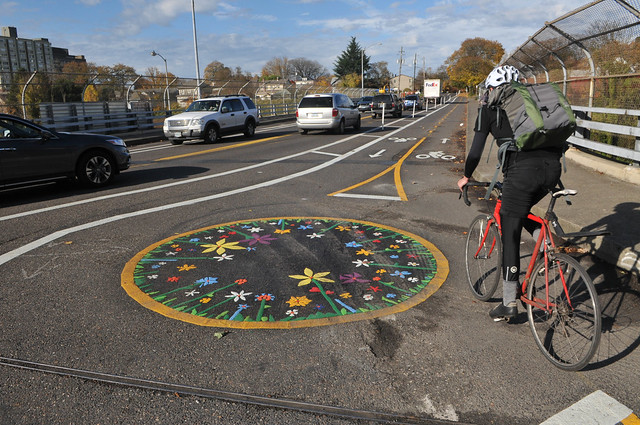
(Photos: J. Maus/BikePortland)
Slowly but sure our city’s transportation bureau is creating more protected space for cycling. I took a closer look at the latest example of this on the Northeast 21st Avenue bridge over I-84 just east of the Lloyd District.
As we reported back in May, it’s one of the nine projects in the hopper citywide that feature physical separation between cycling and driving traffic.
“It’s now the most bicycle-friendly crossing of the Banfield in inner Portland.”
— Roger Geller, PBOT bicycle coordinator
PBOT has significantly changed the lane configuration on 21st between Multnomah and Pacific (at Sunshine Dairy) to include a paint-only buffered bike lane on the west side of the overpass and a two-way bikeway on the east side physically protected with flex-posts and rubber curbs. There are also bike-related additions to the north and south ends of the project in order to facilitate cycling connections to the Lloyd District (via the existing bikeway on Multnomah) and southeast neighborhoods (and eventually the 20s Bikeway).
The project is also the debut of Portland’s first-ever bicycle roundabout — a paint-only circular feature at the south end of the project that aims to improve safety at a four-way cycling junction.
To get the space needed for these additional non-motorized lanes, PBOT slightly narrowed the two standard vehicle lanes and removed a few auto parking spaces on each side of the bridge.
The changes in bike access now give southbound riders two options: A buffered bike lane if you are headed west after I-84, or a protected bike lane if you are headed east. For northbound riders, PBOT has painted a left-turn box in the northeast corner of the intersection at Multnomah and 21st in order to improve the westbound connection (toward Lloyd Center Mall destinations).
PBOT Bicycle Coordinator Roger Geller said during an interview last week that the changes make 21st Avenue, “The most bicycle-friendly overcrossing of the Banfield in inner Portland” (which he also admitted isn’t saying much).
Let’s take a closer look at the southern end of the project.
As you approach northbound from the southern end at Sunshine Dairy and NE Pacific Street, you see the start of the bi-directional, green-colored bikeway. The curbs, buffer space, and delineator posts are welcome here because of heavy truck traffic in the area.
Advertisement
As you get to the overpass, there’s a new ADA crosswalk and stop signs for motor vehicle users…
Here’s a view looking south from I-84 toward the southern terminus of the project at Pacific:
The roundabout feature is about 5-6 feet in diameter and has been creatively adorned with a flower theme…
Here’s another view of the circle…
And looking southbound…
Our friend Jeff Johnson calls it a “community circle” and took this fun video of it yesterday:
As you can see, the angles of entry to and around the circle for auto users (from northbound 21st) and bicycle users (from northbound 20th and southbound 21st) are not gradual or even possible to use perfectly. When I asked PBOT engineer Andrew Sullivan about this last week, he said that’s sort of by design. “I understand people aren’t going to ride it the way it’s intended to ride,” he said. “It’s really there to raise awareness to look out for other cyclists.” In other words, the circle is a tool to encourage caution and communicate an expectation to road users that people might be coming into it from different directions.
Once on the overpass, the two-way bike lane feels good. Keep in mind that this isn’t a high-volume bicycle corridor yet. This means you’ll usually have plenty of room to ride. It’s also worth noting that all these changes create a much more balanced cross-section, which leads to people driving more slowly and increases the safety of everyone.
Notice the leaves building up as it approaches Multnomah. This is a problem PBOT needs to address. This many leaves degrades the quality of the facility…
Here’s the two-way facility looking southbound from Multnomah…
One very important aspect of this project is how it provides a much safer environment for young people who attend Da Vinci Arts Middle School which is just a few blocks southest of it. During both of my recent site visits I saw a lot of pre-teen kids biking by themselves (as in both photos above). It was so awesome to see them in a protected lane!
Notice how the kids in the image below are using the new, green-colored left-turn box in order to continue west on Multnomah…
This project also comes with a new buffered lane on the west side of the overpass. This is the location where the PDX Transformation group installed unsanctioned cones due to the high rate of drivers who cut into the bike lane at the corner. Below is a shot of someone riding at the crux of that corner…
While these changes are great to see, we still don’t gave continuous connections to other protected facilities on either end.
Here’s what you get if you continue north of Multnomah…
And here’s what you get if you continue south of Pacific…
After watching this during peak-hour traffic twice now, I think it’s a big improvement. Yes it’s strange and will take some getting used to, but overall it provides more dedicated space for cycling, it reduces driving speeds, and it improves important connections on either end.
And yes, people are already illegally parking inside the bike lane. When I rolled up yesterday, a water delivery truck was parked across both lanes, leading to this classic display of frustration…
I suspect this type of behavior will go away once folks get used to the changes.
Speaking of which, it seems bicycle riders have mixed feelings so far.
A Jimmy Johns bike delivery guy who told me he rides this overpass 15 times a day said he likes the new protected bikeway because of how it allows him to connect more easily to neighborhoods east of 21st; but he doesn’t like the circle. He was worried about possible conflicts from bicycle riders not paying attention.
Yesterday a woman emailed us to express her disapproval. “The two-way thing is so awkward!,” she wrote.
Have you ridden through here yet? Tell us what you think.
— Jonathan Maus, (503) 706-8804 – jonathan@bikeportland.org
BikePortland is supported by the community (that means you!). Please become a subscriber or make a donation today.



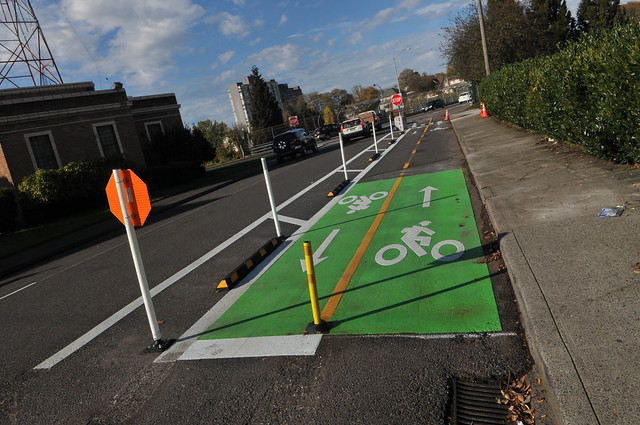
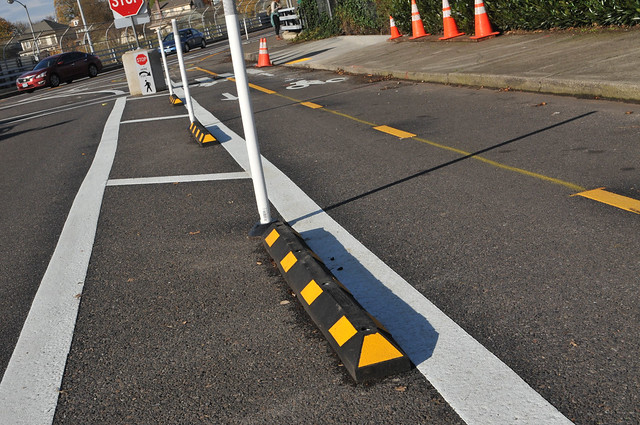
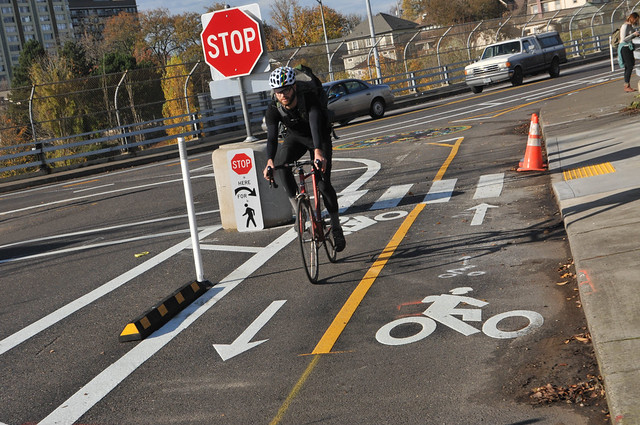
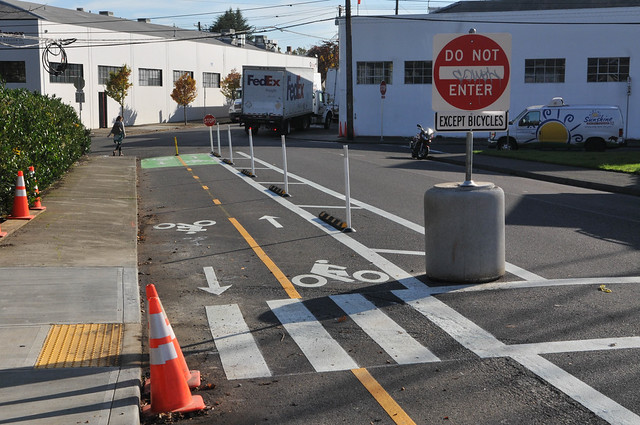
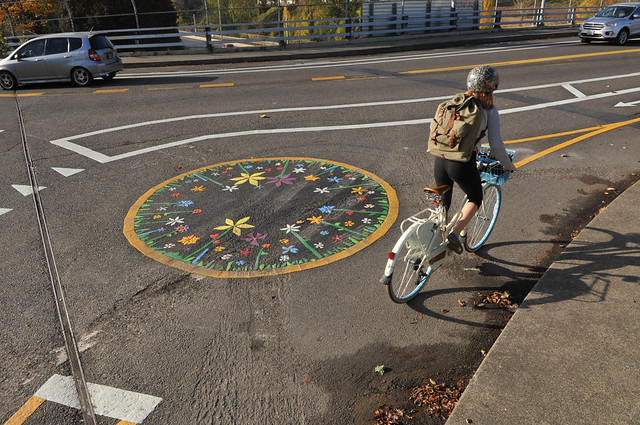
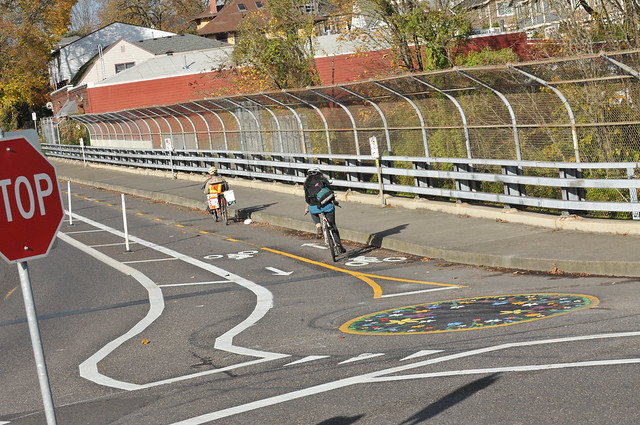
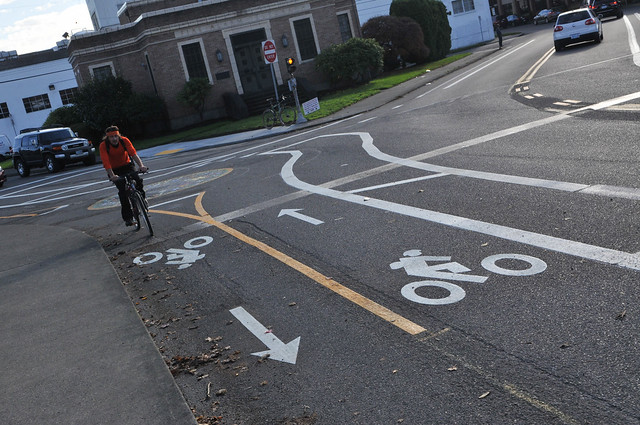
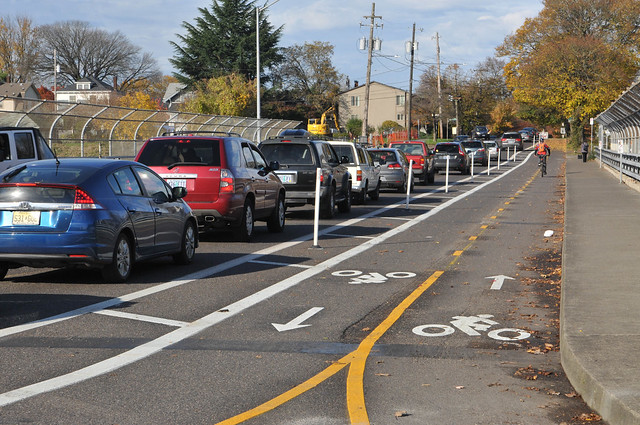
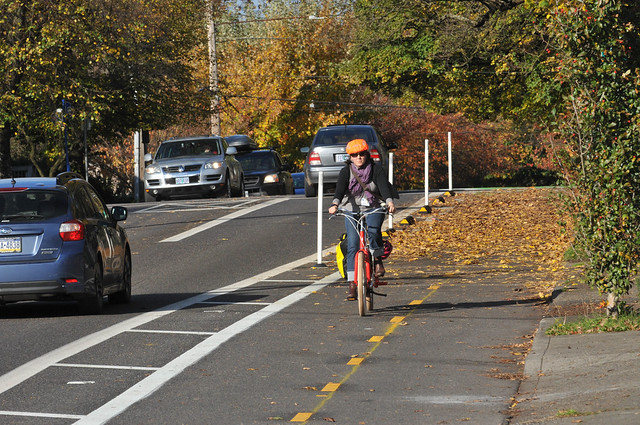
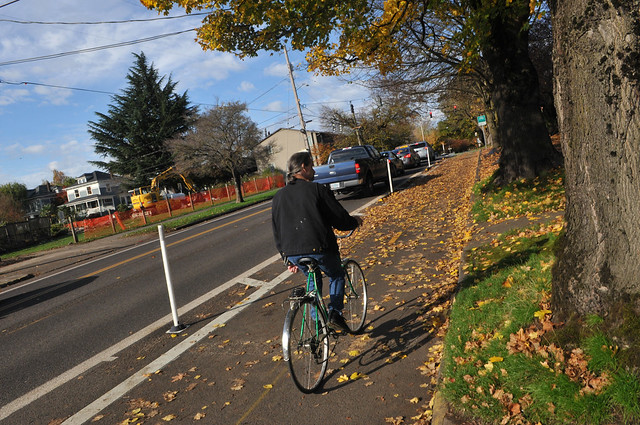
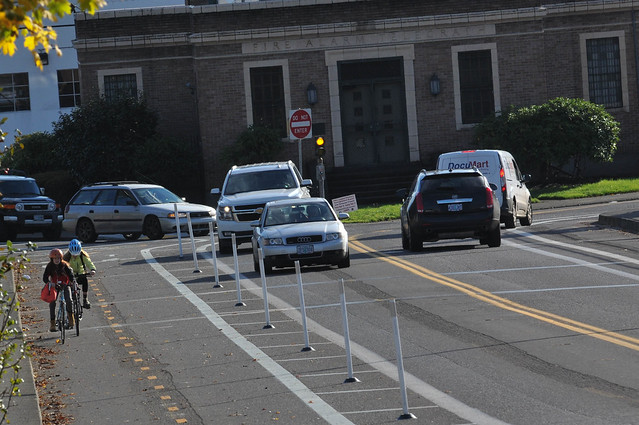
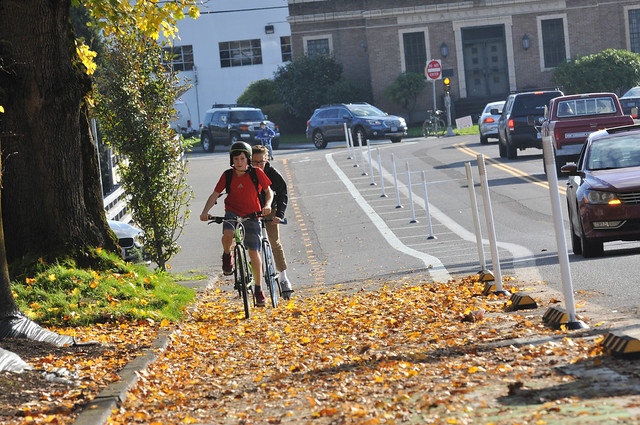
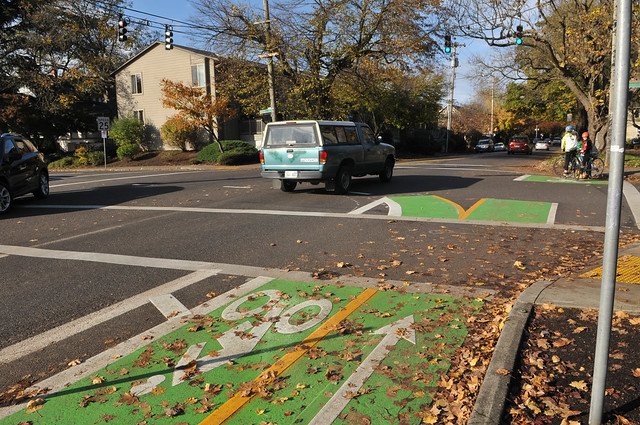
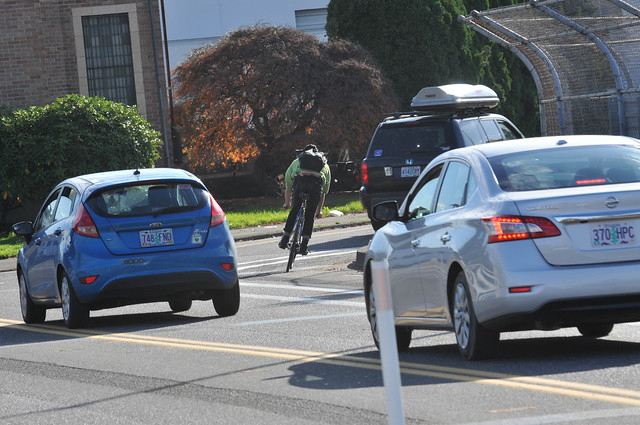
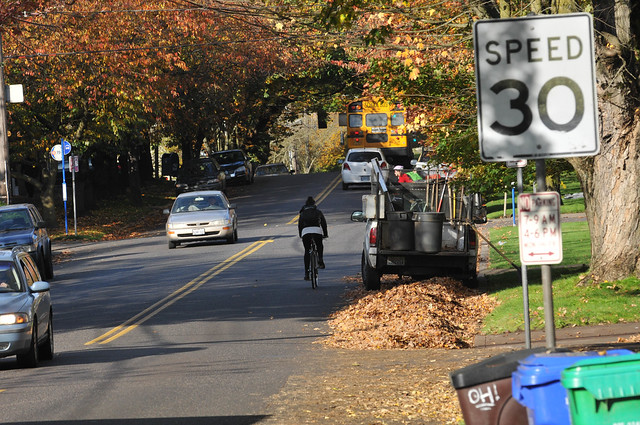
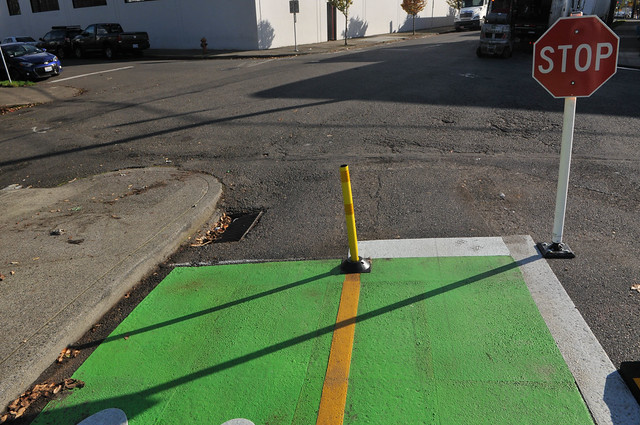
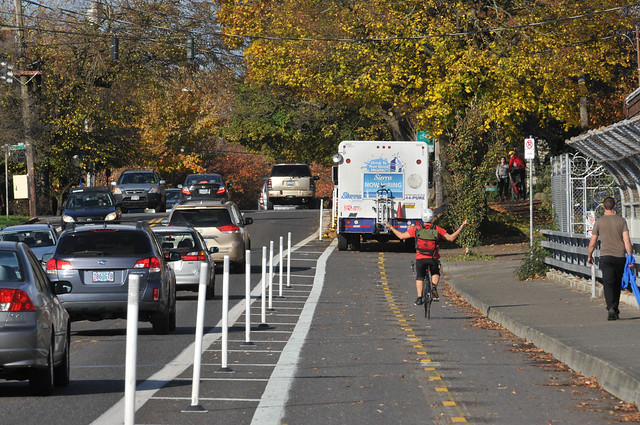
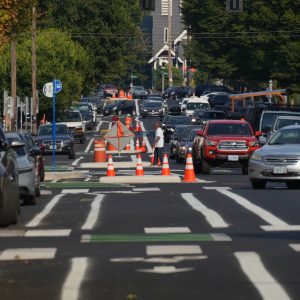
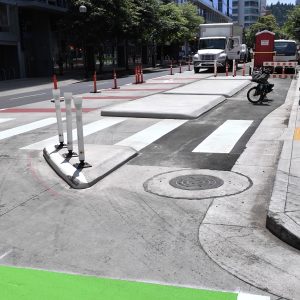
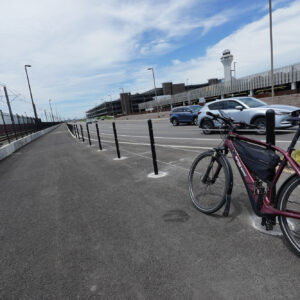
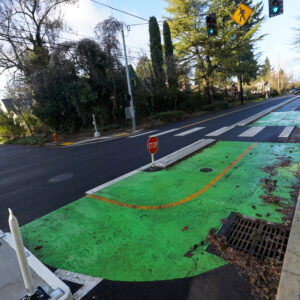
Thanks for reading.
BikePortland has served this community with independent community journalism since 2005. We rely on subscriptions from readers like you to survive. Your financial support is vital in keeping this valuable resource alive and well.
Please subscribe today to strengthen and expand our work.
so now lines on the road are just suggestions?
is that why it’s ok to make bad lane design? because the expectation is that nobody will obey them?
the first picture showing all the motor vehicle tire marks over the circle was the first face-palm…
then seeing how a northbound cyclist coming from 20th has to slow way down and make a sharp left at the circle was another…
and still no plastic posts to protect the southbound west side lane…
I don’t go this way often but when I do I’ll be taking Andrew Sullivan’s advice and bombing through the middle of it taking the most logical path…
keep trying, PBOT, keep trying…
“Oh, the leaves.”
Well, at least we know a sweeper can get in there. I mean, if a Sierra Springs delivery truck can do it…
Who gets watered delivered to their house in Portland? Is that a thing?
There are several businesses in the Carriage House office building at the end of the overpass.
Not to mention the lines might as well be invisible on a rainy night. Watch out for drivers not familiar with the road.
rode through with a trailer southbound. The trailer ran over the yellow flex-post at the south end of this project. I don’t know why that one is needed — but I may have been slightly off-center as well
Do we put obstacles in the roadway that drivers will hit if they are “slightly off-center”? I despise the bollards that are placed at the entrances to paths like this. I understand they are to prevent
self-redacted pejorative adjectivemotorists from driving on bike paths/MUPs, but they also hamper (and present a danger to!) those that are intended to use the path.Yes. Circles and islands.
Indeed, but it comes down to what “slightly off-center” means. I would bet the “shy distance” provided between the curb and a traffic-dividing island is comparatively a lot bigger than it is for bollards on paths (I’d love to know the actual minimum measurements specified in each case). As others have noted, even the plastic curbs and bollards separating this protected bikeway from the rest of the road are on the bike lane side of the painted buffer, giving the maximum possible leeway for being “slightly off-center” to…motorists. I can usually squeeze past bollards like this with little trouble, even on the cargo bike, but I always tell any of my young passengers, “no wiggling” prior to any such squeezing, because one small miscalculation or wobble and we’re toast. I’ve never once worried about crashing my car because I don’t have the skill to squeeze between the curb and an island. It shouldn’t be a circus trick.
When someone on a bike has to slow down, it takes more practiced skill to keep a line that will stay on the path and avoid the bollard; drivers don’t have that problem. I suppose we could just tell bicyclists they need to stop and walk past these obstacles if they don’t think they can squeeze through; I mean, we tell motorists that all the time, right?
What prevents drivers from driving over so much of the paint? Even Rust Belt cities have protected bike lanes.
“What prevents drivers from driving over so much of the paint?”
those great motorist morals of course!
I ride this all the time so this is a welcome addition. But the stretch of 21st from the overpass to Weidler is problematic. People drive aggressivly here and I often ride on the sidewalk when I am sensing madness from the motorists that day. The parking should be removed from the sides of 21st and a bike lane installed.
The stretch from the bridge to Weidler is the part of Portland where I have had the most negative experience with people in cars during my 15+ years riding here. I’ve been yelled at, honked at, pushed to the side, and nearly hit multiple times. The overpass improvements are appreciated, but until we fix the north and south connections it is all window dressing.
Absolutely agree. I almost saw a woman on a bike get ran over yesterday trying to merge with traffic heading northbound at the Multnomah intersection. I would love it if they extended this bikeway to Tillamook on the north end where the Waldorf School is located.
The fact that northbound cyclists are now to the extreme right will make it even harder to merge into northbound traffic north of the bridge. PBOT fail.
I agree, the section between the overpass and Broadway/Weidler is sketchy.
Even I agree with this.
Talk about low hanging fruit…
A solution in need of a problem. Crossing the bridge is not the problem with NE 21ST…
This route is part of my daily bike commute. I personally love it, and just wish they had put in jersey barriers or something more physically imposing than bollards. It now feels considerably safer, and I don’t feel the bi-directional aspect is awkward at all. This is one of the few areas of Portland’s bikeways that feels slightly more European. I’m digging it.
An overly complicated solution that doesn’t actually solve the problem, which is that the bike lane abruptly ends on either end of the bridge. The 2-way lane is completely pointless here and the roundabout is just window dressing.
The south end looks sketchy for southbound bikes – hopefully drivers from the side street will be looking to their right before pulling out
The south end is complicated by the fact that huge Sunshine Dairy trucks park in the middle of the street at all times of day and night. Sometimes they even spill over into the intersection. From a safety perspective, this is a less than ideal way to mix bikes and freight.
OTOH, traffic at the south end is negligible.
I’ll continue using the lane on the west side of the bridge for going south. Thankfully someone involved in this project had the good sense to keep it.
And that’s the big issue I have with these two-way “cycle tracks”: somebody is going to be going the wrong way. Drivers on side streets like Pacific are only expecting traffic to come from one direction: the south. They are not looking north for wrong-way bicyclists prior to crossing or turning onto 21st. The same problem exists anywhere a MUP crosses a street; it’s the only situation in which I’ve been hit by an actual car. Granted, there is a
threefour-way stop here, but there is the added awkwardness of a stopped southbound bicyclist on the wrong side of the road facing a stopped northbound motorist. Normally, both of these parties could proceed at the same time, but that is now a conflicting movement, as the bicyclist has to cross the motorist’s path to get over to the right side of 21st to continue south. Will this encourage sidewalk riding southbound on the east side of 21st? Will bicyclists/drivers get angry at each other because they each believe they have right-of-way? Will bicyclists have close calls or get hit here due to the confusion and forced conflict? Time will tell.What a cluster.
The two-way cycle track design looks decent (and actually has posts protecting it, which is a rarity for Portland!) What I don’t understand is the bike roundabout. Bikes cannot make a turn at that radius without slowing down to almost zero. This means that most people will just ride over the paint. Roundabouts make sense for cars because they reduce conflict points and enable high-volume throughput. But bicycles are not cars, and the benefits of roundabouts don’t apply to cycling. Why not just use a standard T-junction with sharks teeth here?
Roundabouts for bicycles do exist in many places in Europe, and they work. This is not a place that needed a roundabout.
You mean like this one? 😛
That bear pit is soul crushing.
Also – looks like they put a round peg into a square hole.
Roundabout is such a poor idea. Not only is it unusable by bikes but it takes away from space that could have been used for a buffer between bike lane and auto lane on that corner. Cars will cut over that paint and into oncoming bike lane all the time. Having two lanes for sounthbound traffic is also strange… eliminating one would give more space for wider lane and simplify options / reduce potential conflict… Personally it seems that one way bike lanes on each side of the bridge with buffers on both would have been better. Getting to and using the Eastside SB bike lane seems to be an inconvenience. Having two way bike traffic on the one way street of 21st Cir is unexpected and a poor idea. NB cyclists on 20th having to lookout for SB at the roundabout is added conflict.
I am only a fan of two way cycle paths when they are substantially wider and significantly removed from auto lanes. All or nothing, we can’t just drop European style designs into existing American roads half arsed…
Yes, I was also perplexed by the painted bike lane on the opposite side of the street (which was not pictured in this article for some reason). Seems like a waste of space that could be better used elsewhere. PBOT loves the “give all style of riders their own option” approach, but in practice, this only creates confusion.
If it isn’t there the options for anyone who wants to continue southbound on 20th are cross 20th to get on the right side of the street or ride down the wrong side of the street.
I’ve been thrilled with the change. I almost always ride 21st northbound (I take 28th southbound), and I very much like the separation. The best part, though, is the section between 84 and NE Multnomah; the transformation of the rightmost auto lane/parking into a cycling facility makes that section much more pleasant.
They need to remove the parking on 20th from bridge to Sandy and put in a bike lane. That’s a tough area on a bike as traffic gets very backed up at Sandy and theres no easy way to cross sandy if you continue down 21st because there’s no traffic light and Sandy is so busy. I’d love to see a protected bike lane on 20th all the way from Broadway down to Powell. Going North-South in this area is extremely tough and inefficient, magnified by lone fir cemetery which blocks north-south routes for several blocks
NE Irving connects to the crossing at NE 22nd which has a dedicated bike signal, a contraflow bike lane, and is a decent connection lower stress streets going south (via the Glisan bike lane).
Two of the worst parts of my commute have been made worse: merging back into the auto traffic on both ends of the bridge.
Jonathan, nice detail on this article. Related to your comment about cleaning the leaves out of the bike lane, is there any way you can shed some light on current PBOT practices related to bike lane cleaning and leaf removal – especially on arterial bike lanes? Does PBOT have an actual plan or strategy specifically related to arterial bike lane leaf removal? If so, what is it? Or, is there no specific plan and bike lane safety is simply prioritized for leaf removal with every other street that is on their cleaning route? I know they only have so many crews to go around, but it seems to me PBOT should have a plan to go after arterial bike lane safety and cleaning with distinct priority over regular neighborhood streets, and that they should have a target list of problem spots to clean frequently during this time of the season, in order to provide priority to cycling safety over just cleaning up around parked cars on quiet streets.
I agree! The leaves on Interstate Ave heading southbound (hear the hill) are pretty bad. I was actually thinking of getting my snowshovel and bagging them.
“All curbed residential streets get swept only 1-2 times per year. All major arterials get swept 6-8 times per year”. [Source] Though, since the city doesn’t enforce any parking regulations when sweeping (nor can they, since there literally is no schedule for sweeping – “too many factors beyond PBOT’s control always result in delays to their street sweeping schedule”), they likely will never be able to clean the actual curb. PBOT provides a laundry list of reasons they couldn’t do their job properly:
I also highly doubt that PBOT owns a small-scale sweeper capable of cleaning protected bike lanes.
So in short: PBOT will sweep your street probably once a year. PBOT can’t properly sweep if your car is in the way, so make sure to move it before sweeping day. Although, the city has no idea when your street will be swept, so you have no way of knowing when to move your car. Good luck!
Not true. Leaf collection =! street sweeping.
Street leaf collection occurs based on this schedule: http://www.portlandoregon.gov/transportation/article/363503. The city tends to wait as late as possible to sweep leaves so that it can be completed as best as possible.
Nothing is perfect because there are legitimate reasons why they cannot pick up every leaf that falls on the road.
Ah, I had no idea this was a thing! How does it work when there is no adjacent property resident (like a highway overpass)?
Oh, I had no idea leaf day was a thing because my Richmond residence is not within the leaf zone…
That’s only true for specific “leaf collection zones”. Most people don’t live in one of those.
I’m talking about bike lanes, painted lanes of travel, with bike lanes on major arterials and high use bike routes (like N. Interstate Ave). Why are these treated as any other road with respect to sweeping? I’m not talking about the street in front of your house, unless you live on one of these, nor the on-street parking areas.
If the city designates a lane of legal travel in the gutter of the road, and they attempt to maintain all road gutters free of excessive leaf debris, doesn’t it make sense that they should prioritize leaf removal from gutters with travel lanes in them over random neighborhood streets designated for on-street car storage? Perhaps sweep those bike lane arterials known to have many trees over them 2 – 3 times from the period of Oct 15 to Dec 1?
Call maintenance, 823_1700.
Only a few more blocks to connect to the Ne Irving-Glisan bike lanes. Why couldn’t Pbot just bite the bullet and finish it? It is a WHOLE TWO blocks to the south…….but in typical fashion we do 90% of a project and call it done.
That is exactly what I told KATU when they interviewed me on Monday. Overall I like the Project, but please….. PBOT, connect it to the network to the south. At least to the north there is the choice of Multnomah to 16 th or 26th……it is only a few blocks.
The obstacles in the buffer need to be placed on the car side of the buffer. They can crash a cyclist, especially with the narrow width, but don’t present the same risk to motorists.
Once again, PBOT goes bikey and fails.
This is absolutely fantastic! Finally we’re starting to get protected bikeways and more European designs 🙂
Yea for protected bike lanes.
Nay for such a convoluted traffic flow. Ugh.
The traffic circle is ill conceived. Northbound cyclists attempting to transition from the flats to the uphill of the bridge are forced to lose all momentum and negotiate a very tight radiused turn. I’m sure most will eventually disregard the paint and cut the corner, risking a collision with the now two-way cycle traffic. I don’t know who thought this was a good idea. The issue with the bridge has aways been southbound bicycle traffic being pinched between the grate and car traffic. Bicycles are not mini cars and simply miniature versions of car-based traffic solutions are almost never appropriate.
I don’t have any input about the functionality, as I don’t bike in that area, but I love that they took the time to decorate the circle with flowers! The little thermoplastic embellishments on our bike facilities brighten my day.
Sigh. I’d be happy if the Halsey/205 overpass sidewalk just got an occasional sweeping.
Traveling south on the east side of the overpass is sweet if you want to go east on the other end – gets you out of having to deal with a left turn in aggro traffic sometimes. So there’s that. Also, cool for kids. I like seeing them farther from cars.
But seriously, the overpass was always the take-a-breather bit of the trip for me – it’s everything around the overpass that sucks.
There are so many problems that need fixing on both sides of the overpass, but they chose to ignore all of them and just make the existing infrastructure more confusing and less safe. The only worthwhile accomplishment of this project was the removal of the parking on 21st at Multnomah, but this was far outweighed by the wrong way cycle lane on the east side of the overpass. Why the hell are they routing bikes into the area back by the dairy full of truck and forklift traffic? Why not take out the parking between Irving and the overpass and put in a bike lane to connect up the Irving bike lane which gets a lot of commuters turning onto 20th to cross the freeway at 21st? (Also this section between Irving and the overpass is where I saw a car hit a bike just a few weeks ago.) If PBOT keeps making things more “bike friendly” with projects like this, I’m going to have to start driving everywhere. PBOT needs to start understanding the difference between increasing the safety of cyclists and increasing cyclists perception of safety. Lately they seem to only be focusing on perception, not actual safety.
There’s just no thought or effort towards creating logical and intuitive routes linking major E-W and N-S bike arterials. It’s pathetic. Like the hawthorne bridge bike lane just ending at naito.. thats a key difference between PDX and European cities – Portland really does not deserve all the accolades it gets and is completely resting on its laurels
Makes you wonder how an agency tasked with the very sober job of making our streets safer/better can be trusted on the big stuff if they continuously opt for these ridiculous feel good designs over those which actually accomplish something. The kind of grownup decision making apparently in short supply at PBOT. Making cycling on 21st that whole stretch would require real sacrifices and trade offs. The lack of real leadership is embarrassing.
This project seems more like something someone thought would look good in “Cycling City USA” literature than something anyone thought would actually make cycling in this area better.
This is a preview of what PBOT has in mind for the 28th Street crossing of I-84. Slowly but surely PBOT is over-designing every single bike infrastructure project they build. It is not a pleasure to cycle on these ridiculous designs, it is a pain in the ass.
It sounds to me like there needs to be more citizen input (perhaps folks from here) involved in the PBOT planning – who is in charge now? They need to toss out ideas on this site before just implementing whatever craziness they conjure up in their offices
And yet, if you don’t want to use the paint, you can ignore it. Big picture: people can finally use a SEPARATED BIKE LANE?! Do you know how long we have been waiting for these? Look at the fancy picture on the ground as you go by You have time to look at it because you’re not fearing for your life for this brief moment on your commute. Thank you PBOT.
No, you can’t just ignore the paint, once it is down the law requires you to use it. Protected bike lanes are even worse, they create too much segregation, separate but unequal. As I have said numerous times, the state needs to repeal ORS 814.420, the mandatory bike lane statue, before PBOT installs any more of these lousy ‘experiments’. THEN you can ignore the lines, and just have to deal with irate motorists and not the law also. There is absolutely no benefit to the two-way bike lane on the ease side of this bridge, they should have just widened and buffered the existing one-way bike lane here and called it good.
I find it curious that in the top pictures, the bollards are placed almost in the bicycle lane, rather than in the middle of the buffer (as in the bottom pictures).
Why was this design choice made?
Looks good…this is one of my primary bike ways into Portland…will have to try it to see how it works…though the placement of some of the signage may need to be tweaked…so as to not crowd the bikeway (optical illusion?!)
I tried it today going South and got dumped out behind the milk factory – very inconvenient as I was heading South towards hawthorne area.. cars in that area also had no idea what I was doing and were not expecting bicyclists as there’s no signage indicating 21st is a bike route…
Ignorance of the southbound bike lane on the other side of the bridge says more about you than PBOT.
Now I need an alternate route from inner SE to inner NE. It’s bad enough that bike riders in deep SE ride the wrong way in the bike lane, now I “legally” have bike riders coming right at me.
Heaven forbid you should have to pay attention while riding. You sound like a motorist.
Pay attention, are you joking? I’ve ridden motorcycles at speeds that can kill you instantly, paying attention is absolutely instinctual for me. My concern is inexperienced riders coming toward me and passing me a foot from the end of my handlebar. All they have to do is oversteer a little and we both go down.
There was already a bike lane on both sides. I don’t see how creating an atypical circumstance like bikes to right of the car travel lane being oncoming traffic is a good idea even with the buffer. And what exactly do you do where it ends? Merge across oncoming traffic?
Putting bike lanes in placea where drivers won’t look? Good way to get someone killed. There’s a good reason why ODOT spent 30 years eliminating this 1970s failed experiment.
This is what happens when you let people with more interest in marketing and publicity design projects.
Reminds me of that silly raindrops and umbrella crosswalk by CC Slaughters. Just more Instagram-ready infrastructure.
Privately funded road art is the end of the world?
The art is not the problem. Trying to use art as a traffic control device is the problem. It would be like replacing a stop sign with a copy of the Mona Lisa and then wondering why no one is stopping. Traffic control devices and pavement markings should be clear and unambiguous. Superfluous pavement markings distract road users from relevant markings and traffic control devices.
Man…you guys. You write as if bikes are suvs and paint on the roads are chains of oppression.
Thanks to ORS 814.420 paint on the road has become a tool of oppression used against cyclists.
Thanks PBOT. Keep it up! Please make connections to this separated bike lane.
I for one really love the new improvement. I use this bridge a lot and continuing south on 21st when on the right side of the road dumps you out on Sandy overflow traffic with no bike lane, meaning that during a very tight, blind S turn you gatta somehow take the lane. That road is far too tight with parking to share the narrow lane. I always hate that part so often i take my chance and cut across two lanes of traffic with oncoming traffic having a blind corner and zip down the wrong way entrance to the dairy. All of this was always crazy and now i can navigate this space 100% safely. Cheers to this new improvement. Whatever it’s short comings, it’s perfect!
If it has shortcomings, how is it perfect?
I really don’t understand all the Trump-esque negative comments about this project. I rode thru this new section south and northbound to and fro Foster road today. It’s a great connector and positive step forward making bicycling easier and safer in Portland.
Yes, from reading this you’d think the general skill level of Portland cyclists was quite low. Maybe those unable to successfully navigate it should watch the middle schoolers riding through it every school day to help them figure it out.
Likely, most of those commenting are looking only at the photos and haven’t actually ridden through it. I think there’s a lot of that on bikeportland. I believe that’s called “arm chair quarterbacking.”
I rode through this yesterday and found I didn’t “do it right” from my turn/connection coming northbound on NE 20th. This even after reading this thread. The entry angle was much sharper than I figured it would be, and there’s no (that I saw) signage. Of course now that I’ve been through it on a bike, I get it.
I figure cyclists will treat the circle as a “mixing zone” and just ride through it however they need to make their turns and continue on their way.
Of greater (and real) concern is having a car cut the corner and have a head-on with a cyclist (who is following the traffic flow.) I do believe there needs to be some fixed yellow pillars spaced around the circle to protect the route and prevent that from happening.
I just rode through this for the first time today. Wow. It was the worse piece of “protected” infrastructure I have ever seen. Why is there an unprotected bike lane in the southbound direction when the “northbound” is a two-way cycleway? Coming from the east on NE Multnomah, I ended up in the painted lane rather than the cycleway. I also had to turn right across the right turn lane because the bike lane is in the middle, rather than along the curb. Arriving at the other side of the highway, I nearly got clobbered turning left. There are so many blind corners. Coming back across was better, though I just rode right over the bike roundabout because my bike can’t turn that tightly. Turning back onto NE Multnomah was dangerous as I simultaneously had to avoid turning cars.
Overall an extremely poor effort. I will likely not be using this crossing again.
“I also had to turn right across the right turn lane because the bike lane is in the middle, rather than along the curb.”
I haven’t seen this new arrangement, but a regular bike lane should never be painted to the right of a right-only lane. If you want to turn right, stay in the right-only lane and turn with the rest of traffic.
The whole thing is a joke. An SNL skit for bike planning.
Does anyone at PBOT ride a bike or is this just all for show.
Pathetic.
The salmon lane (where you have one lane between two oncoming lanes, as in the first picture) is something Oregon DOT spent literally decades to remove from Farmington Road west of Beaverton. This design should have never been reintroduced, and only serves to encourage new riders to ride against traffic as a norm. It not only normalized left-hand upstream riding, but it doesn’t do anything whatsoever to let driveways and intersections know of the extremely unusual lane pattern. This street kills people, the same way Farmington routinely killed people before they fixed it.
Just do what Tulsa did on 11th Street, center turn lane, extra wide bicycle lanes, making a five lane street on what was formerly a four lane street without having to move the curbs at all. This counts in this case since there used to be parking on both sides. I know Portland can do this, since it managed to rub two braincells together to spark a clue for Foster Blvd.